| |
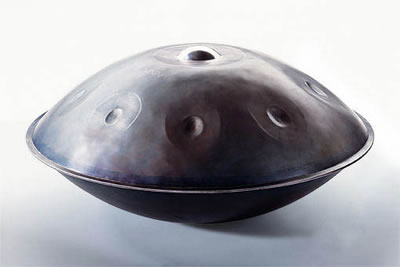
Like a 1950s flying saucer, the Hang's sound is out of this world !
 Listen to a
short solo of the Hang being played Listen to a
short solo of the Hang being played
|
| Hang (Hang Drum) |
Hang means "hand" in the
Bernese language, and is pronounced "hung or hong". The Hang was
developed in Switzerland. It was the result of many years of research
on the steelpan and the study of the diverse collection of instruments
from around the world, such as Gongs, Gamelan, Ghatam, drums, bells,
etc. The instrument is played with the hands.
Udu-like sounds are produced with the air resonance, the sounds
of the clamped shallow shells sound like bells or harmonically
tuned steelpans. The inner note on the bottom dome is the
bass note, and when played in a dampened way allows change
in pitch like a talking drum. Seven to nine notes are tuned
harmonically around a central deep note. The hemispheres are hardened by a process known as gas-nitriding. This is a thermal treatment process in which nascient hydrogen atoms diffuse into the steel and form nitride compounds with many of the alloys in the steel.
|
|
| The very limited availability of the Hang, as well as its cost, may be out of reach for many. A newly developed instrument called the HAPI Drum a fun and easy to play melodic steel tongue drum, may be of interest for players of the Hang or Hank Drum, and is available from HapiTones.com |
|
Watch some videos of the Hang Drum below
Tuning the Hang with Steel Drum Hammers |
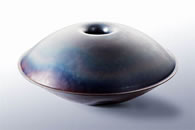 |
Hangs have been made using in over 45 different scales. Go here to listen to them and see the scales
| The Ding side contains 8 tone fields which together form the "tone circle" (scale or mode). This circle surrounds a central dome, called the Ding, which sounds like a Gong.
On the Gu side (underneath), there is a hand size hole called the Gu for sound resonance. The Gu can also be played like an udu, or used to modulate the sound of the DING.
The instrument is generally held in the player's lap and played with the hands, although it can also be played with soft mallets. By changing the position of his/her knees, the player can change the deep note and vary the timbre of the instrument while playing. The Caribbean steelpan is probably the most important new acoustical instrument to develop in the 20th century. Since its invention in Trinidad some 50 years ago, improvements in the technology and design have resulted from research in Europe and the United States in addition to its home country of Trinidad and Tobago. It has also inspired the development of new steel instruments, such as the PANG family of instruments and the hand-played HANG. |
|
Hot Rod Hang
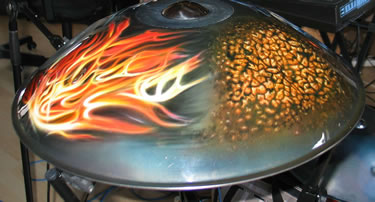 |
with Airbrush Artwork
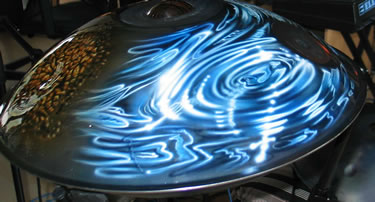 |
|
HangART :-)
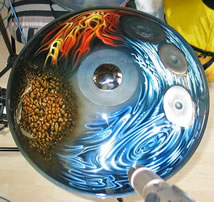 |
Hang Hardshell Case
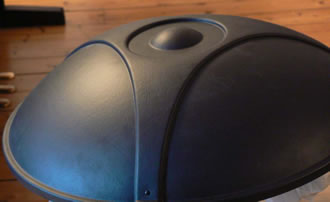 |
Hang Tone Layout
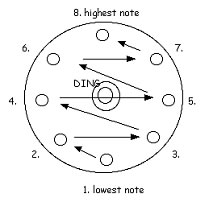 |
|
|
|
|
|